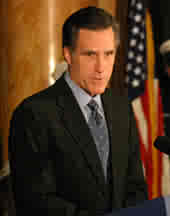
Massachusetts governor Mitt Romney recently announced that he will not seek re-election. As a result, there has been a lot of speculation as to whether Romney will run for president. Much of the discussion has focused around Romney's alleged "Mormon problem," that is, how a conservative Republican candidate, who is also Mormon, will be received by evangelicals and the Religious Right. A recent
article in
The American Spectator summarized this concern by stating:
In short, much of this thoroughly Christian country has a thing against the Mormon faith. As NR's John Miller reminded readers in his Romney profile earlier this year, a 1999 Gallup poll found that while only 6 percent of Americans refuse to vote for a Jew and 4 percent a Catholic, 17 percent rule out Mormons on their ballots.
The article concludes:
Forget about the press's old maxim, "Does it play well in Peoria?" This doesn't play well in Colorado Springs or in your local church. If there's any doubt, look at the 2004 National Day of Prayer, when Mormons asked to offer a prayer. Shirley Dobson, wife of Focus on the Family's Dr. James Dobson, said no. These aren't small matters, especially to evangelical Christians. The press will report them as soon they take Romney seriously. The country may not openly discuss the Mormon faith when it considers Romney's candidacy, but you can bet they'll be whispering about it. And it will play a role.
It's anybody's guess at this point how this will all play out, assuming Romney does in fact decide to make a run for the Republication nomination. But my guess is that evangelicals will likely opppose Romney given his Mormon faith, an opposition informed by evangelical countercult portraits, rather than take his faiths into consideration in light of broader political and strategic considerations connected to a conservative Republican candidate. This one will be interesting.
 Massachusetts governor Mitt Romney recently announced that he will not seek re-election. As a result, there has been a lot of speculation as to whether Romney will run for president. Much of the discussion has focused around Romney's alleged "Mormon problem," that is, how a conservative Republican candidate, who is also Mormon, will be received by evangelicals and the Religious Right. A recent article in The American Spectator summarized this concern by stating:
Massachusetts governor Mitt Romney recently announced that he will not seek re-election. As a result, there has been a lot of speculation as to whether Romney will run for president. Much of the discussion has focused around Romney's alleged "Mormon problem," that is, how a conservative Republican candidate, who is also Mormon, will be received by evangelicals and the Religious Right. A recent article in The American Spectator summarized this concern by stating:
1 comment:
Just wanted to let you know you forgot the word 'in' before 'fact' in the last paragraph.
Post a Comment